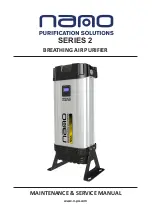
2
- 27
2
W-2WAY ECO-i SYSTEM
Outdoor Unit Repair Procedures
10. Compressor
10-2-4. Dry core cleaning
If burning or other failures occur repeatedly at compressors within the same system, in many cases the cause is
acid, sludge, carbon, or other substances that remain in the refrigeration cycle as the result of insufficient cleaning.
If, when the oil is inspected, there is an outdoor unit where the oil color phase is 4.0 or higher, or where a sharp
odor is present, carry out all steps below to perform dry core cleaning.
And use the bidirectional dry core for refrigerant R410A.
(A) If a ball valve is installed on the outdoor unit
(1)
Refer to “5-2-1. Cooling operation (for all units)” and operate all outdoor units in either Heating or Cooling mode.
(2)
If all units are operated in Cooling mode, close first the liquid tube service valve then the ball valve on all out-
door units where dry cores will be attached.
If all units are operated in Heating mode, close first the ball valve then the liquid tube service valve on all out-
door units where dry cores will be attached.
* This step is performed in order to expel refrigerant from the tubing between the liquid tube service valve and
the ball valve. Approximately 4 – 5 seconds is a sufficient interval between closing each of the 2 valves.
(3)
Press the
button on the outdoor unit maintenance remote controller to stop the operation of all units.
* If the outdoor unit maintenance remote controller is not available, use the following method to stop the oper-
ation of all units:
Pull out the SCT connector (2P) (YEL) (CN231) from the outdoor unit control PCB of the unit where pump-down is
being performed. When the SCT connector is pulled out, alarm F12 (sensor trouble) immediately occurs and all
outdoor units stop operating. Be sure that you do NOT grasp the lead wire when pulling out the connector. Remov-
ing any other connector may not cause the units to stop. Therefore be sure to pull out only the SCT connector.
(4)
Connect a refrigerant recovery device to the liquid tube service port (Schrader-type valve) of all outdoor units where dry
cores will be attached, then recover the refrigerant from the tubing. Be sure that no air enters the tubing at this time.
When the hose is connected, internal pressure is applied by the remaining refriger-
ant in the inter-unit tubing. The connection port employs a Schrader-type valve. To
determine when refrigerant recovery is compete, follow the instructions in the
instruction manual of the refrigerant recovery device.
(5)
As shown in Fig. 21, disconnect the tube that runs from the liquid tube valve to the ball valve on all outdoor
units where dry cores will be attached. Then attach the dry cores.
(6)
At all outdoor units where dry cores are attached, pressurize with 3.3 MPa of nitrogen from the liquid tube
service port and check for leaks.
(7)
After evacuating all nitrogen gas from the tubing, apply vacuum from the liquid tube service port to all outdoor
units where dry cores are attached until the pressure is –101kPa (–755 mm Hg, 5 Torr) or less.
(8)
Fully open the liquid tube valve and ball valve on all outdoor units where dry cores are attached.
(9)
Operate all outdoor units for approximately 3 hours (in either Heating or Cooling mode or mixed Cooling and
Heating mode).
(10) Follow the above procedure, and replace all dry cores with new dry cores.
(11) Operate all outdoor units for approximately 20 minutes (in either Heating or Cooling mode or mixed Cooling
and Heating mode).
(12) Follow the instructions in “3. Discharging Compressor Oil” and drain a small amount of the oil from the oil sepa-
rators of all outdoor units where dry cores are attached. Check the color phase, odor, and other characteristics.
(13) If the results show that dry core cleaning is still necessary (for example, a color phase of 4.0 or higher)*,
return to Step 11 and repeat until the results are normal (including a color phase of 3.5 or less)*.
* Color sample sheet for degree of stain
Perform another dry core replacement after approximately 30 hours of system operation.
(14) Perform steps (1) – (4), and remove all dry cores. Then connect the tubing between the liquid (narrow) tube
valves and the ball valves.
(15) At all outdoor units where dry cores were removed, pressurize with 3.3 MPa of nitrogen from the liquid tube
service port and check for leaks.
ON/OFF
CAUTION
CAUTION
sec2-document.qxd:sec2-document.qxd 08.8.22 1:39 PM Page 27
















































